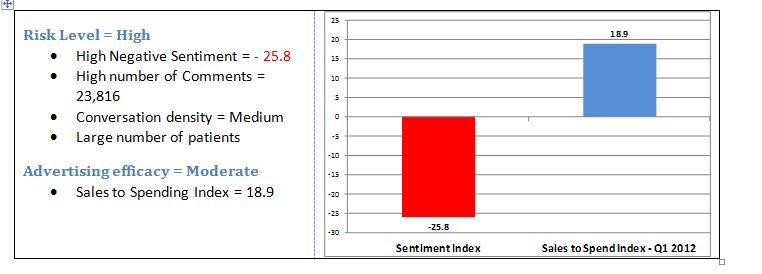We continue our series on the online reputations of the top 10 DTC-spending brands in Q1 2012 with an examination of the once popular statin Lipitor. If you are in need of a refresher course of the study’s methodology or terminology click here, and if you want to take another look at how Cymbalta is perceived online click here. Otherwise it is time to dive into cyberspace and take a look at Lipitor.
Lipitor
We evaluated 23,816 conversations for this report.
Sentiment for Lipitor is the fourth lowest of the top 10 advertised drugs of 2012. Negative sentiment is driven by side effects, primarily muscle cramps and weakness, GI issues, liver issues, memory loss and headaches.
Side effect awareness has increased over the years as patients, many older, evaluate their own side effects against perceived benefits. Also, as the years have progressed, patients have learned to question their doctors more often about muscle loss, liver damage, joint pain, the protective aspect of statins on the heart, and the role of statins in developing diabetes. Patients who have felt that their physicians did not take their concerns seriously enough increase negative sentiment towards Lipitor and statins overall.
Awareness and use of homeopathic treatments such as red rice yeast, coenzyme Q10, phytosterols and other supplements are suggested as alternatives to Lipitor and other statins by some patients. Physician opinions do not always align with patients even when patients have improved cholesterol numbers using supplements, diet and exercise or when they read clinical studies that highlight potential issues with statins. Those disagreements also negatively impact sentiment. Many patients are done being “good” and are becoming more proactive and vocal about what they will and will not take.
There is a backlash from both type 1 and type 2 diabetes patients over the preventative use of statins, more so in the type 1 communities. Patients whose LDL and HDL are in normal ranges do not see the benefit and those who have tried Lipitor and experienced side effects are adamant that others not take Lipitor preventatively. Many patients go head-to-head with their endocrinologists over this issue; for some patients they simply do not want to take anymore medication that they don’t believe is needed since diabetes management is enough work. Other patients have had some experience with Lipitor and side effects and do not believe that there is added benefit worth the issues that they experienced or read that others have experienced.
On the positive side, marked patients do see strong cholesterol lowering with Lipitor. Also, patients with heart problems such as those with valve issues, awaiting heart surgery, bypass and stent patients, and angioplasty patients see Lipitor in a positive light.
Main Issues Contributing to Negative Sentiment
• Side effects including liver damage, muscle cramps, muscle weakness, shortness of breath, fatigue, gastrointestinal problems, arterial fibrillation, weight gain, and memory problems that many times go unacknowledged by physicians.
• Many patients do not believe that the cardiac benefits are worth the side effects and there are more physicians who are becoming more skeptical as well.
• Younger women worry about taking Lipitor while still thinking of having children. Patients with kidney disease questions whether they should be taking Lipitor.
• Concern about statins causing cancer that diminish and increase over time but contribute to persistent negative sentiment.
• The lack of discussion or consideration by physicians of homeopathic, natural and holistic approaches to lowering cholesterol.
• Type 1 diabetes patients push back on recommendations of the prophylactic use of Lipitor and other statins for heart disease prevention and react highly negatively to information that statins can increase the risk of developing type 2 diabetes.
Main Aspects Contributing to Positive Sentiment
• Effective in the treatment of high cholesterol; many patients feel it is the best drug for them.
• Patients are happy that generic Lipitor is an option.
Potential Areas of Risk
• Generic status is the largest risk to the brand.
• However, other risks include patient pushback on the information that statins can increase the risk of diabetes and decreasing belief in the cardiac benefits.
Remember, it is important not to dismiss the negative sentiment surrounding a drug just because it involves side effects and there is nothing a company can do to reduce a drug’s side effects. Instead, help forge a strong patient-physician bond by educating physicians on how to discuss side effects in a manner that acknowledges patient experiences and addresses how to work around them to keep patients compliant. Also, help patients bring side effect concerns forward to their physicians for conversations showing them how to “discuss” rather than “complain.” Engaging patients with information about side effects and how to deal with them is better than just ignoring something that you cannot change.
Next month we will dive into the social status of Cialis.








